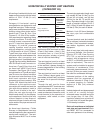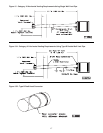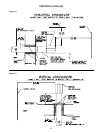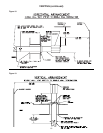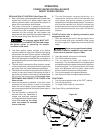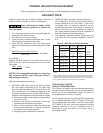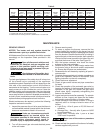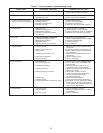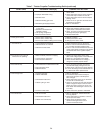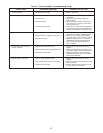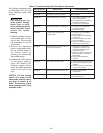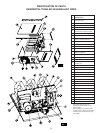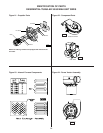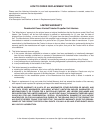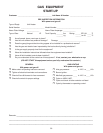
24
1. Relocate thermostat away from outside
wall or drafts.
2. Check thermostat circuit for open and close
on terminal strip on heater “R” and “W”.
3. Check thermostat circuit for shorts “staples
piercing wires”.
4. Check for 24v on gas valve terminals when
thermostat is not calling.
5. Refer to “Installation”.
1. Tighten all electrical connections.
2. Adjust heat anticipator setting for longer
cycles. Refer to “Electrical Connections”.
3. Check for proper air supply across heat
exchanger and proper gas supply.
4. Relocate thermostat .
1. Replace or tighten.
2. Clean power ventor wheel.
3. Realign power ventor wheel.
1. Check and tighten wires on fan circuit.
2. Test for 115v on terminal ACB Heat and
“L2” if voltage is present replace motor.
3. Test for 115v on terminal ACB Heat and “L2”
on the control board, if voltage is not present
45 seconds after trial for ignition replace
board.
1.
Check motor amps against motor name
plate, check voltage, replace if found defective.
2. Check for 115v between motor leads.
3. Check terminal ACB Heat for voltage if
voltage not constant, replace board.
1. Turn 115v power off to the unit, wait 10
seconds and reapply voltage to the unit.
2. Check wiring of fan circuit to wiring diagram.
3. If unit is not calling for heat and board is not
in a flash code mode, replace board.
1. Refer to “Operation”.
2. Is the heater output sized correctly for
heat loss of the space. Has the space
been enlarged.
3. Check thermostat circuit, 24v on terminals
“R” and “W” on terminal strip.
4. Check air movement across heat exchanger.
Check voltage and amps at the fan motor.
Check gas input to ensure unit is not over
fired. Check heat exchanger to ensure unit
is not dirty.
5. Check orifice size, replace if undersized.
1. Refer to “Operation”. Check orifice size.
If too big replace.
2. Check thermostat for operation, to ensure
circuit open and closes.
3. Check wiring per diagram; check
operation at the gas valve, look for
a short in thermostat circuit.
1. Thermostat located incorrectly.
2. Improper thermostat wiring.
3. Shorted circuit.
4. Defective sticking gas valve.
5. Excessive gas supply pressure.
1. Loose electrical connections at thermostat
or gas valve.
2. Excessive thermostat heat
anticipator setting.
3. Unit cycling on high limit.
4. Poor thermostat location.
1. Power ventor wheel loose.
2. Power ventor wheel is dirty.
3.
Power ventor wheel is rubbing on the housing.
1. Loose electrical connections.
2. Defective motor or overload.
3. Defective control board.
1. Motor overload protection is tripping.
2. Loose wiring or connection.
3. Control board is defective.
1. Control Board is in flame failure mode.
2. Fan improperly wired.
3. Defective board.
1. Incorrect gas input.
2. Heater undersized.
3. Thermostat malfunction.
4. Heater cycling on limit.
5. Incorrect orifice sizes.
1. Unit is over fired.
2. Thermostat malfunction.
3. Heater runs continuously.
Table 7 - Tubular Propeller Troubleshooting Guide (continued)
SYMPTOMS
POSSIBLE CAUSE(S) CORRECTIVE ACTION
I. Burners will not shut off.
J. Rapid burner cycling.
K. Noisy power ventor.
L. Fan will not run.
M. Fan motor turns on and off
while burner is operating.
N. Fan will not stop.
O. Not enough heat.
P. Too much heat.



